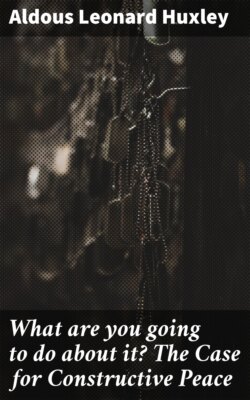Читать книгу What are you going to do about it? The Case for Constructive Peace - Aldous Leonard Huxley - Страница 6
На сайте Литреса книга снята с продажи.
IV
ОглавлениеTable of Contents
So much for the third objection; now for the fourth. "We may dislike war," says the heckler, "but war has always been used as an instrument of policy and we must presume that it always will be so used. Consider the lessons of history and be resigned to the inevitable evil."
Now, until recent years, the lessons of history lent a certain support to the militarists. Romans, Greeks, Egyptians, Babylonians, Sumerians—all used war as an instrument of policy. The written records and archæological documents seemed to show that wars had been invariably correlated with civilization. Primitive peoples, like the Eskimos, might be ignorant of war and find the very idea of it inconceivable. But the civilized had always used it—and presumably would always continue to use it. Recent archæological research has shown that this correlation between war and civilization has not been invariable. The civilization of the Indus Valley was as rich and elaborate as those of Sumer and Egypt. But it was a civilization that knew nothing of war. No weapons have been found in its buried cities, nor any trace of fortification. This fact is of the highest significance. It proves that it is possible for men to enjoy the advantages of a complex urban civilization without having to pay for them by periodical mass-murders. What men have done, they can do again. History teaches us that war is not inevitable. Once again, it is for us to choose whether we use war or some other method of settling the ordinary and unavoidable conflicts between groups of men. Where there's a will—and, along with will, feeling and intelligence—there's a way. The nature of that way will be discussed later.
